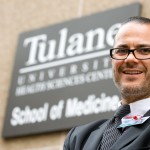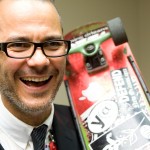You are here
Leading, Advocating: Tulane Physician Advocates for HIV Prevention
This story was gathered during David Snyder's visit to New Orleans. David reports on CDC programs in action for the CDC Foundation.
Dr. MarkAlain Déry spent more than a decade as a flight physician and was on the ground responding to patients in the aftermath of the January 2010 earthquake in Port-au-Prince, Haiti. Today, as an instructor of clinical medicine at Tulane University’s School of Medicine in New Orleans, he is applying his expertise to a passion for HIV prevention and testing in a city that ranks among the nation’s highest in AIDS diagnoses.


“Since Katrina, there have been tremendous opportunities to create positive change,” Déry says. “There is more need and people are more receptive.”
For Dery, that opportunity for change has taken shape as the New Orleans Society for Infectious Disease Awareness, a nongovernmental organization he founded in 2010 to raise local awareness about HIV. Bringing to the effort both his skills as a physician and his passion for the cause, Déry says he is increasingly playing the role of activist.
“I believe we need people to stand up and be a voice for people who don’t have a voice,” he says. “Here in New Orleans, that often means advocating for those with HIV.”
While HIV is a growing concern in New Orleans, the city has also suffered high profile disasters in recent years. Hurricanes Katrina and Gustav in 2005 and 2008 made international news. In April 2010 the largest oil spill in U.S. history devastated Louisiana’s Gulf Coast. The disaster, Déry says, could not have happened at a worse time.
“There was this feeling in the air that New Orleans was coming back, with the Super Bowl win and Mardi Gras,” Déry says. “And then this oil spill happened and just pulled us back.”
In an effort to prepare leaders like Déry for disasters, the Centers for Disease Control and Prevention (CDC), the CDC Foundation, Harvard School of Public Health and the Robert Wood Johnson Foundation presented a Southeast Louisiana Meta-Leadership Summit in New Orleans in June 2010.
Meta-Leadership Summits bring community leaders from different sectors together before a disaster strikes to strengthen disaster response and recovery efforts. As a speaker and a participant at the Summit in New Orleans, Déry joined other community leaders from the business, government and nonprofit sectors to better understand the role that each can play before, during and after an emergency.
“Within the past five years, this city has seen the worst disasters this country has experienced,” he says. “Let’s face it. Katrina was not a natural disaster; it was a manmade disaster. The oil spill was a manmade disaster too.”
PROGRAM SNAPSHOT
Purpose:
The Meta-Leadership Summit for Preparedness is a unique national initiative to better prepare business, government and nonprofit leaders to work effectively together during a public health or safety crisis. Through the Summit, leaders learn skills needed for effective action during times of crisis and build organizational connections to strengthen community preparedness for responding to and recovering from emergencies. Learn more at www.meta-leadershipsummit.org.
Funding Partners:
The Summit is supported on the national level by the Robert Wood Johnson Foundation. In lieu of a registration fee for Summit participants, local sponsors cover the Summit’s operational expenses.
Program Partners:
CDC, National Preparedness Leadership Initiative – Harvard School of Public Health
CDC Principal Investigator:
Andrea Young, Ph.D., Office of Public Health Preparedness and Response
CDC Foundation’s Role:
The CDC Foundation is organizing more than 30 Summits in cities across the country to train 3,000 leaders. For each Summit, the CDC Foundation identifies local hosts and sponsors from the business, government and nonprofit sectors and works with them to develop a successful Summit in their community.
